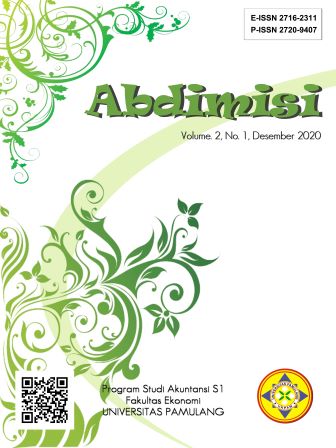Sosialisasi PMK 164 tentang PPh UMKM Bagi Umat Gereja Katolik St. Barnabas, Pamulang, Tangerang Selatan
Abstract
Abstrak
PMK 164 tahun 2023 tentang Tata Cara Pengenaan Pajak Penghasilan Atas Penghasilan Dari Usaha Yang Diterima Atau Diperoleh Wajib Pajak Yang Memiliki Peredaran Bruto Tertentu Dan Kewajiban Pelaporan Usaha Untuk Dikukuhkan Sebagai Pengusaha Kena Pajak sangat penting untuk diketahui dan dapat dipraktikkan oleh pengusaha yang tergolong UMKM untuk dapat menghitung dan menyetor kewajiban pajaknya secara benar, lengkap dan jelas. Tidak dapat dipungkiri untuk dapat memahami aturan pajak seringkali dibutuhkan bantuan dari pihak lain yang lebih kompeten dari sisi bahasa, penggunaan istilah, dan mungkin tata caranya perhitungan sampai pelaporannya. Demikian juga yang dihadapi oleh UMKM umat Gereja Katolik St. Barnabas, Pamulang, Tangerang Selatan kesulitan dalam mempraktikkan aturan pajak yang bersifat dinamis. PKM yang beranggotakan dosen-dosen dari Fakultas Ekonomi dan Bisnis Program Studi Sarjana Akuntansi, Universitas Pamulang, bertujuan membantu UMKM yang tergabung dalam umat Gereja Katolik St. Barnabas, Pamulang, Tangerang Selatan untuk dapat lebih memahami PMK 164 sehingga ujungnya akan menjadi lebih patuh dalam menjalankan hak dan kewajiban perpajakannya.
Kata Kunci: PMK 164, Pajak UMKM, Pengusaha Kena Pajak
Socialization of Pmk 164 on PPh UMKM for The Congregation of St. Barnabas Catholic Church, Pamulang, South Tangerang. Barnabas, Pamulang, South Tangerang. PMK 164 of 2023 concerning the procedure for imposing income tax on the business income received or obtained by taxpayers who have a certain gross distribution and business reporting obligations to be confirmed as taxable entrepreneurs is very important to know and can be practised by entrepreneurs classified as MSMEs to be able to calculate and deposit their tax obligations correctly, completely and clearly. It is undeniable that in order to be able to understand the tax rules, it is often necessary to have the assistance of other parties who are more competent in terms of language, use of terms and perhaps the procedures from calculation to reporting. Similarly, the MSMEs of St. Barnabas Catholic Church, Pamulang, and South Tangerang have difficulties in practising the dynamic tax rules. PKM, which consists of lecturers from the Faculty of Economics and Business, Bachelor of Accounting Study Program, Pamulang University, aims to help MSMEs belonging to the congregation of St. Barnabas Catholic Church, Pamulang, South Tangerang to better understand PMK 164 so that they will eventually become more compliant in carrying out their tax rights and obligations.
Keywords: PMK 164, EMKM Tax, Taxable Entrepreneur
References
Aryanti, D., & Andayani, A. (2020). Pengaruh self Assessment System Dan Pengetahuan Perpajakan Terhadap Kepatuhan Wajib Pajak. Jurnal Ilmu dan Riset Akuntansi, 9(7).
Dharmawan, Y. E., & Adi, P. H. (2021). Kompleksitas pajak, moral wajib pajak dan norma subyektif terhadap kepatuhan perpajakan. Jurnal Penelitian Dan Pengembangan Sains Dan Humaniora, 5(2), 212-219.
Dirjen, P. (2021). Peraturan Direktur Jenderal Pajak Nomor PER-12/PJ/2021 tentang Edukasi Perpajakan. Jakarta
Furqon, R. H., Affandi, A., & Suwanda, D. (2022). Ketidakpatuhan Wajib Pajak dalam Aksi Korporasi yang Berpotensi Menurunkan Penerimaan Pajak Negara. Ekonomis: Journal of Economics and Business, 6(2), 757-765.
Kumaratih, C., & Ispriyarso, B. (2020). Pengaruh kebijakan perubahan tarif PPH final terhadap kepatuhan wajib pajak pelaku UMKM. Jurnal Pembangunan Hukum Indonesia, 2(2), 158-173.
Leviana, M., Adriani, A., & Norlena, N. (2022). Pengaruh pengampunan pajak, pemahaman peraturan perpajakan, pemahaman akuntansi, kualitas pelayanan fiskus terhadap kepatuhan wajib pajak dengan preferensi risiko sebagai variabel moderating. Fair Value: Jurnal Ilmiah Akuntansi Dan Keuangan, 4(8), 3471-3488.
Pramudya, A. H. P., Wibisono, A., & Mustafa, M. (2022). Self Assessment dalam Hukum Pajak. Jurnal sosial dan sains, 2(2), 361-374.
Prihastuti, A. H., Al Sukri, S., & Kusumastuti, R. (2023). Pengaruh Kebijakan PP Nomor 55 Tahun 2022 dan Kepercayaan kepada Pemerintah Terhadap Kepatuhan Wajib Pajak UMKM. Jurnal Pajak dan Bisnis (Journal of Tax and Business), 4(1), 56-65.
Rinaldi, M., & Ramadhani, M. A. (2024). Peningkatan Literasi Perpajakan dalam Kalangan UMKM: Langkah Menuju Kemandirian Finansial. Eastasouth Journal of Effective Community Services, 2(03), 158-169.
Statistik, B. P. (2024). Realisasi Pendapatan Negara (Milyar Rupiah), 2022-2024. Retrieved from https://www.bps.go.id/id/statistics-table/2/MTA3MCMy/realisasi-pendapatan-negara--milyar-rupiah-.html
Downloads
Published
Issue
Section
License
Copyright (c) 2024 Wiwit Irawati, Alexander Raphael, Sutandijo Sutandijo

This work is licensed under a Creative Commons Attribution-ShareAlike 4.0 International License.
Copyright Notice
Authors who publish with this journal agree to the following terms:
- Authors retain copyright and grant the journal right of first publication with the work simultaneously licensed under a Creative Commons Attribution License that allows others to share the work with an acknowledgement of the work's authorship and initial publication in this journal.
- Authors are able to enter into separate, additional contractual arrangements for the non-exclusive distribution of the journal's published version of the work (e.g., post it to an institutional repository or publish it in a book), with an acknowledgement of its initial publication in this journal.
- Authors are permitted and encouraged to post their work online (e.g., in institutional repositories or on their website) prior to and during the submission process, as it can lead to productive exchanges, as well as earlier and greater citation of published work (See The Effect of Open Access).
Abdimisi have CC-BY-SA or an equivalent license as the optimal license for the publication, distribution, use, and reuse of scholarly work.
In developing strategy and setting priorities, Abdimisi recognize that free access is better than priced access, libre access is better than free access, and libre under CC-BY-SA or the equivalent is better than libre under more restrictive open licenses. We should achieve what we can when we can. We should not delay achieving free in order to achieve libre, and we should not stop with free when we can achieve libre.
You are free to:
- Share — copy and redistribute the material in any medium or format
- Adapt — remix, transform, and build upon the material for any purpose, even commercially.
- The licensor cannot revoke these freedoms as long as you follow the license terms.

